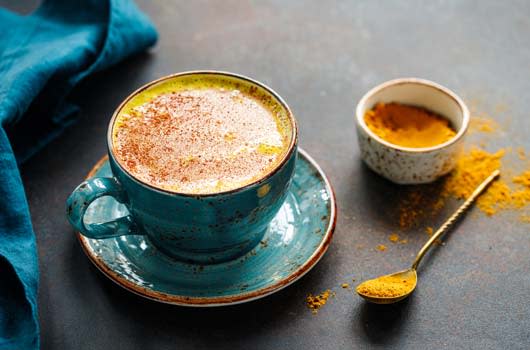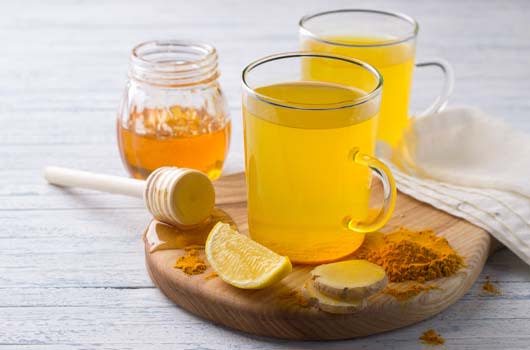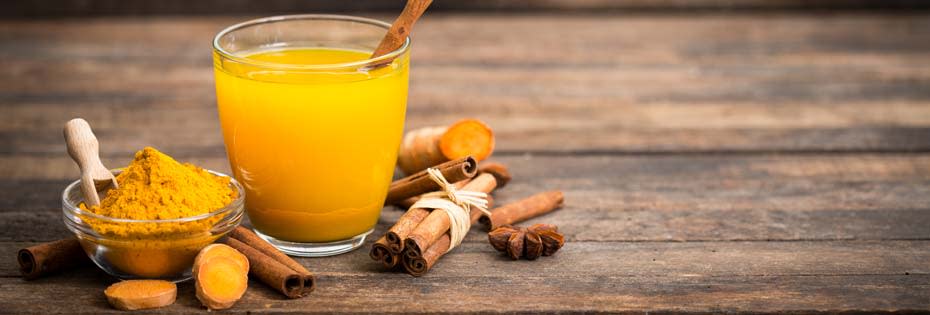Is taking a turmeric supplement better than drinking a turmeric latte?
We now know that turmeric is good for you, but what is the best way of taking it? Do you receive the same benefits from say, a turmeric latte or cup of turmeric tea as you do with taking a supplement? In this article we take a look at the benefits of turmeric supplements versus turmeric drinks..
Turmeric and Turmeric Supplements
Turmeric has been used for thousands of years in traditional medicines and foods. Originating from the ginger family, turmeric is a root spice that is frequently used in Asian food. If you’ve ever noticed a bright yellow colour in a curry dish, it’s likely that it comes from turmeric.
When it comes to its medicinal side, curcumin, the main active ingredient in turmeric is the most beneficial for us. NCBI1 explains turmeric as being ‘a well-documented treatment for various respiratory conditions (e.g., asthma, bronchial hyperreactivity, and allergies), as well as for liver disorders, anorexia, rheumatism, diabetic wounds, runny nose, cough, and sinusitis.’
In traditional Chinese medicine, it’s used to treat diseases associated with abdominal pain. In Ayurvedic medicine, which dates back to ancient times in India, turmeric has been used to treat sprains and swelling. Here in the western world, we tend to look to turmeric to help with inflammation as well benefit from its antioxidant, antibacterial and antifungal effects.
Due to its growing popularity, turmeric can be found in many different forms. Oils, capsules and powdered forms are most common, but it can also be found in skin products and food products. The key issue with many of these products is to note that turmeric is not well absorbed naturally in the body. This means there are certain things we must do to make sure we are gaining all of the benefits when we consume it. Turmeric is fat-soluble, not water-soluble. This means that if ingested with fat, our body can absorb the nutrients much easier than with water. So when it comes to drinking turmeric lattes and teas, are we really getting all the benefits?
Turmeric Lattes

Turmeric lattes, also known as golden milk, could potentially provide you with the benefits you need but it depends on what the latte is made with. Most golden milk is made with coconut or almond milk, pepper, maple syrup and even some ginger or cinnamon. All of these ingredients added can be anti-inflammatory and can allow you to get the most from turmeric.
When other ingredients, like unrefined sugar, are added to the mix, this is where the benefits can decrease as you are adding something that opposes the anti-inflammatory properties. If you want to try making your own turmeric latte why not give this recipe a go?
- 500 ml almond milk or coconut milk
- 2 tsp turmeric powder
- 1/4 tsp black pepper
- 1/2 tsp ground cinnamon
- 2 tbsp honey
Turmeric Tea

Turmeric tea, much like lattes, will also be good for you if the right ingredients are added. As we mentioned before, turmeric is not a water-soluble spice. This means that consuming it in tea may not be as good for you unless you add the necessary ingredients to aid in its absorption. In this case, with no fat, we would be looking at adding ingredients like ginger, lemon and honey to improve the taste and potential benefits.
- 500 ml of water
- 2 tsp ground turmeric
- Chopped fresh ginger
- 1 tbsp honey
- 1 lemon wedge
Are there any major differences between drinking a turmeric latte and taking a turmeric supplement?
So, when it comes to taking turmeric in powder form (food, lattes and teas) or supplement form (capsules or extract), which one is better? It all comes down to absorption and also how much turmeric you are consuming.
When it comes to absorption, as long as we are adding fat to turmeric, you will be looking at an improved rate.
When it comes to how much turmeric is being added, we need to understand that due to this lack of absorption, we’d have to consume a lot. Anywhere from one to two teaspoons (4 – 6 grams) of turmeric will give you a healthy dose and is enough for you to reap the benefits.
However, a supplement, specifically a turmeric extract, will give you the most benefits and will be best absorbed.
This could be due to the amount of curcumin in turmeric powder versus the turmeric extract. Consumer Lab states that: ‘it is not unusual for a capsule containing half of a gram of turmeric extract to provide 400 mg of curcuminoids, while the same amount of turmeric powder (ground herb -- just like the spice) might provide only about 15 mg.’ This shows just how much more curcumin you can give your body through a supplement, rather than in powder form.
In short, there’s nothing to lose by enjoying a delicious turmeric latte, tea or by adding it to a curry, as you’ll be enjoying some benefits. However, the best way to ensure your body absorbs the active ingredient in turmeric, curcumin, is to consume it traditionally with fat, as used in Asian cooking, or make sure you choose a highly absorbable turmeric supplement.
Read our definitive guide to turmeric
References
1. NCBI, Turmeric the Golden Spice, Herbal Medicine: Biomolecular and Clinical Aspects.

